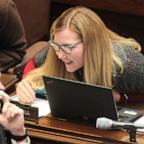For Some Immigrants, DOMA Ruling Comes Too Late
Some gay binational couples still won't benefit from DOMA ruling.
July 3, 2013 — -- Born in Europe, Mark fell in love with an American man while he was visiting New York City. And so decided he wanted to stay in the U.S.
The easiest way to stay here after living in the country illegally for years was to get married, he decided. But instead of marrying the man he loved, Mark married Sara, a straight female friend who decided to sponsor him on a spouse visa in a sham "green card" marriage.
Mark and Sara, whose names have been changed to protect their identities, did everything they could to make their "marriage of convenience" look like the real thing. They exchanged rings, started a bank account, lived at the same address for over a year, and planned a wedding for friends and family. They even went on a honeymoon.
But the charade served a purpose. Mark knew that in order to convince U.S. Citizenship and Immigration Services (USCIS) he was one half of a smitten straight couple, he would need to provide documents and pictures to prove it while undergoing a thorough interrogation. Mark received his green card last year, after five years of planning his counterfeit marriage, and he was finally able to visit his home country for the first time in decades.
"My boyfriend can't officially live with me, so the fear is not totally gone, but it's a huge relief to have my green card after so many years," he said. "I couldn't get a driver's license, I couldn't really travel, I avoided the cops."
Mark has a lot at risk if he gets caught -- a maximum of 5 years in prison and a $250,000 fine. In 2011 alone, there were nearly 4,000 fraudulent green-card marriage petitions discovered by the government.
So why would Mark go through with a sham marriage instead of just marrying his boyfriend?
Until Wednesday, when the Defense of Marriage Act was overruled by the Supreme Court, only marriages between a man and a woman were recognized under immigration law as real marriages, and so only couples of different genders could sponsor their spouses. On Friday, the first visa petition for a same-sex couple was approved for two Florida men -- Traian Popov, a Bulgarian immigrant, and his American husband Julian Marsh.
But for many like Mark, the DOMA decision comes years too late.
"If what happened last week [had] happened 20 years ago, I would have married my boyfriend immediately, I would have turned things around immediately," Mark said. "I'm afraid of lying to any kind of authority, knowing what the risk is if anybody f--cks up, and the word somehow gets out."
An estimated 28,500 binational same-sex couples in the United States were restricted from immigration preferences available to opposite-sex spouses by DOMA.
Many of the couples have been forced to make difficult decisions due to these restrictions -- some immigrant partners attempt to find work visas, and if they can't, some Americans leave the country to be with their significant others abroad. Still more live in the country illegally, risking deportation.
Another couple plagued by DOMA until Wednesday was Ness Madeiros, an immigrant from Bermuda, and her wife Ginger. Married in Massachusetts in 2008, Ginger -- an American citizen -- was unable to sponsor Ness, and without permanent status, Ness was also unable to adopt their 2-year-old son, Jamie. Ness was worried she'd have to risk deportation to be with her family when her student visa expired.
The decision came in time for couples like Ness and Ginger and Traian and Julian. But it didn't for everyone.
Despite the Supreme Court decision, Mark said he will maintain his current marriage visa for now.
"[The decision] is humongous," he said. "It means we finally feel like we matter, we're human like anybody else. It could have of course come sooner, but thank God it came at all."




